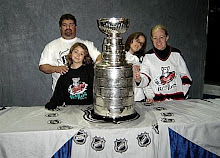Articles that do not support vaccines' involvement in autism
In my research today, I found an interesting post, which relates a number of studies, some of which I was aware, that do NOT support the involvement of vaccines in the causes of autism. My daughter was born in the 1990s, where vaccines containing thimerosal were routinely given, and I have never felt that the procedure caused her autistic characteristics. I have spoken with a number of individuals over the years since her diagnosis, and I tend to side with the possibility of a genetic trait, as yet undiscovered, being at least partly to blame. To say that there is one single autism gene would be wrong. So many of our thousands of genes interact together to create each individual that saying that a single gene is to blame would be a disservice. Nevertheless, I believe that the "correct" combination of genes could be involved. The real key of research should be to determine specifically what in a person's neurological makeup creates an autistic individual. There are so many individual forms and levels of the disorder that putting blame on any one cause seems unlikely. However, until we really understand the neurological "short circuits" that equal autism, it seems to me that we will not be able to accurately determine a cause.
That said, I realize that many out there would disagree with me, saying that we need to prevent autism from occurring in the future. That is the goal of many of these individuals. While I realize that those of us dealing with the autistic individual on a daily basis may want an answer to the question "Why?" on occasion, I believe some of us truly do a disservice to the person with autism when we focus only on that. Autism is a difference that can also be looked at as a gift. Sure, my daughter may be difficult to handle in a classroom. But can't all children be the same way from time to time? (Remember, I am a teacher in an Alternative High School as well!) The differences in these individuals have not only presented the challenges faced by their families, but they have also presented the world with Albert Einstein (whom it is believed had Aspergers Syndrome). We need to remember that when we seek answers to the question "Why?" This is often the question our autistic relatives struggle with more than any. And yet, we expect to get an instant answer to it. Maybe we should focus on another WH question, and maybe it will lead us to the "Why" answer. Let's learn "What" in more detail, then getting "How" figured out can tell us "Why". In research there are always questions. In the meantime, let's enjoy the uniqueness of those with the "gift" of autism. Their unique perspectives can sometimes find answers we overlook. Theirs is a world that may always have a bit of the simplicity ours lacks. We seek answers that to them seem irrelevant. I do not forget that my daughter has PDD-NOS, but I celebrate the unique points of view that her "disorder" provides.
That said, I realize that many out there would disagree with me, saying that we need to prevent autism from occurring in the future. That is the goal of many of these individuals. While I realize that those of us dealing with the autistic individual on a daily basis may want an answer to the question "Why?" on occasion, I believe some of us truly do a disservice to the person with autism when we focus only on that. Autism is a difference that can also be looked at as a gift. Sure, my daughter may be difficult to handle in a classroom. But can't all children be the same way from time to time? (Remember, I am a teacher in an Alternative High School as well!) The differences in these individuals have not only presented the challenges faced by their families, but they have also presented the world with Albert Einstein (whom it is believed had Aspergers Syndrome). We need to remember that when we seek answers to the question "Why?" This is often the question our autistic relatives struggle with more than any. And yet, we expect to get an instant answer to it. Maybe we should focus on another WH question, and maybe it will lead us to the "Why" answer. Let's learn "What" in more detail, then getting "How" figured out can tell us "Why". In research there are always questions. In the meantime, let's enjoy the uniqueness of those with the "gift" of autism. Their unique perspectives can sometimes find answers we overlook. Theirs is a world that may always have a bit of the simplicity ours lacks. We seek answers that to them seem irrelevant. I do not forget that my daughter has PDD-NOS, but I celebrate the unique points of view that her "disorder" provides.


0 Comments:
Post a Comment
<< Home